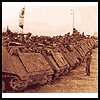










SONG 3907

By Michael Powell
Washington Post
Staff Writer
Monday, April 3, 2006; Page A03
Two prominent academics, a dean at Harvard and a professor at the University of Chicago, have stirred a tempest by writing a paper arguing that the Israel lobby often persuades the United States to set aside its own security to pursue the best interests of Israel.
"No lobby has managed to divert U.S. foreign policy as far from what the American national interest would otherwise suggest, while simultaneously convincing Americans that U.S. and Israeli interests are essentially the same," the authors wrote in a paper posted on the Web site of Harvard's John F. Kennedy School of Government.
"The United States has a terrorism problem in good part," they add a few pages later, "because it is so closely allied with Israel, not the other way around."
The report, written by Kennedy School Dean Stephen Walt and John J. Mearsheimer, a professor at the University of Chicago, has ignited criticism. Academic critics, newspaper editorial pages and conservative bloggers have accused the professors of distorting history and trucking in anti-Semitic stereotypes. Harvard Law professor Alan M. Dershowitz says the professors "destroyed their professional reputations."
"We've heard all this before, the talk of powerful Jewish lobbies and the language one hears on Arab and extreme right-wing Web sites," Dershowitz said in an interview. "This is paranoid and conspiratorial."
Marvin Kalb, a senior fellow at the Kennedy School, said the report was filled with errors, not least the assertion that Israeli forces were better armed and positioned than the Arab armies in the 1947-1948 war. "It does play into the terrible argument that Jewish no-goodniks control the media and our foreign policy," Kalb said.
The professors, in fact, cast blame widely. They pointed at the powerful lobbying group American Israel Public Affairs Committee and at neocon intellectuals, the editorial pages of the New York Times and think tanks such as the American Enterprise Institute and the Brookings Institution, which they say all reveal a pro-Israel slant.
And they are not without academic support. Juan Cole, a professor of Middle Eastern studies at the University of Michigan, suggests the authors make commonplace points -- that U.S. Middle East policy is driven disproportionately by those who favor Israel, and that this lobby resorts to all manner of vile accusations to discredit opponents.
"There's nothing intellectually wrong with arguing that U.S. policy in the Middle East is dislodged from its natural moorings by the power of a domestic constituency," Cole said. "But most people are timid -- they don't want to be smeared and risk having their lives ruined."
Walt and Mearsheimer, leaders in what is known as the "realist" school of foreign policy and stringent critics of the war in Iraq, embarked on their study in 2002 in the aftermath of the terrorist attacks, as the drums beat loudly for an invasion of Iraq. They described a constellation of Christian evangelicals and neocon intellectuals, including then-Defense Department officials Paul Wolfowitz and Douglas J. Feith, who strongly supported Israel and advocated an aggressive expansion of U.S. power in the Middle East.
They unsuccessfully shopped their article -- which pointedly relies on much Israeli scholarship -- here before the London Review of Books published it in March. An academic, footnoted version was posted on the Kennedy School Web site -- but as the controversy raged, the Harvard logo was removed.
"We are arguing it's difficult to fully explain the remarkable level and the unconditional level of U.S. support for Israel by reference to strategic interests or purely moral interests," Walt said in an interview last week. "We knew that some of the responses would not be gentle or fair."
The professors say Israel's American allies have skewed the national interest, inflamed Islamic opinion and endangered U.S. policy around the world. Foreign policy elites, they write, believe U.S. support for Israel's "repression in the occupied territories is morally obtuse and a handicap in the war on terrorism."
Nor, they say, is there much evidence the war in Iraq was about oil. "Instead the war was motivated," they wrote, "by a desire to make Israel more secure.
The authors draw a distinction among Jewish groups, which often have supported the Iraq war, and American Jews, who have opposed the war in greater proportion than most Americans.
Their critique has drawn applause from some liberal Jewish critics. But left-wing Jewish intellectual Noam Chomsky -- a professor at the Massachusetts Institute of Technology -- wrote that the professors took a naive view of U.S. foreign policy. Although he applauded their courage in standing up to "anticipated hysterical reaction," Chomsky wrote that throughout the 20th century a broad swath of the political intellectual class has favored a muscular and illegal exercise of imperial power, in the Middle East and worldwide.
"Has it been a failure for U.S. grand strategy based on control of . . . middle eastern oil and the immense wealth from this unparalleled material prize? Hardly," Chomsky wrote.
University of Maryland professor Shibley Telhami is a fellow at the Brookings Institution and describes the professors as "incredibly bold" at stirring policy and theoretical debates. But, although Telhami is a critic of the war, he does not believe Jewish neocons and their Christian supporters forced the United States into the war.
"There's no doubt that neocons long wanted a war," Telhami said. "But in the end it was the decision of a president who was super-empowered after 9/11 and who could have ignored them."